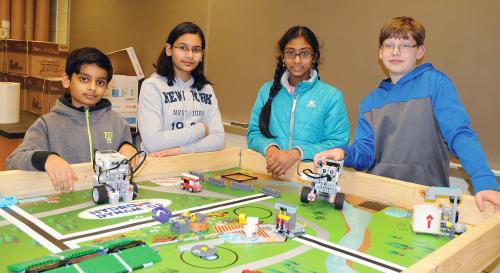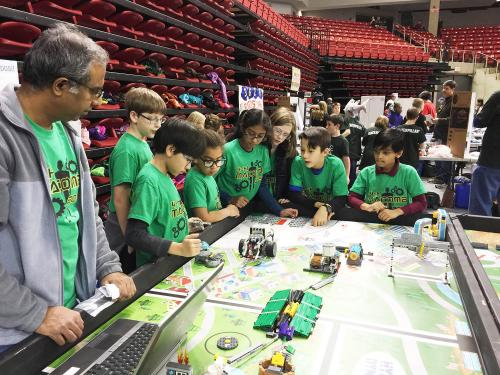University News
WIU Faculty Guiding Local 4-H Members to Learn Robotics, Solve Problems
February 28, 2018
MACOMB, IL – Children from a Macomb-based 4-H club are transforming an educational toy building block into an opportunity to solve world problems with guidance from a group of Western Illinois University faculty.
WIU Physics Professor Kishor Kapale, his wife, Physics Lab Coordinator Aparna Kapale and Computer Science Professor George Mangalaraj are advisors for the 4-H club Macomb Bots. The club was formed several years ago to take part in the competitions of the First Lego League, which challenges children, ages 9-14, to build and program rechargeable Lego-based robots to solve problems, such as food safety, recycling, energy and the water supply.
Children build Lego kits, related to the theme, for placement on an interactive matt. The robots are then programmed to perform tasks within the matt-based playing field to solve a larger problem.
In Fall 2017, Kishor said, club members were asked to identify a problem within the human water cycle and design a solution to make the problem better.
"For the spring competition, they are asked to solve an environmental problem through a series of three tasks and they have a little more freedom," said Kishor. "They can use any building pieces, they don't have to be Lego, and they can build things out of cardboard and other materials."
For the spring competition, April 21 in Springfield, the Macomb students have chosen to solve a problem related to air pollution.
"The kids do all the work," said Kishor. "They also talk to experts in the field they are working in. For the fall competition, they consulted with a petroleum engineer, Mr. Clay Burkholder, who is working on his master's degree at Western. He talked to them about how the leaks are found in the oil pipelines, and how that could translate to city water lines."
The students and their faculty advisors meet one night a week for two hours, with increased meeting times as competitions approach.
"We are essentially a rookie team," said Kishor. "We are learning the tricks of the trade and the kids are excited because they have fun with the building and programming activities. They are learning how to design robots to do tasks without fail every time."
Local children participating in the WIU-based program include Celena Mangalaraj, fifth grade; Atharva Kapale, fourth grade; Nidhi Kapale, seventh grade; Kyler Glaue, fifth grade; Jaydn Glaue, third grade; Henry Lauer, fifth grade and Varek Venugopalan, sixth grade.
Celena Mangalaraj said she is excited about the innovative nature of this season's challenge after taking part in the fall competition.
"We learned so much about water last year and taking a technical problem and solving it with robots," she said. "We also learn how to research and what problems there are in the world."
Lauer said students design the computer code to program the robots. Each competition allows two robots and one of the local 4-H club's robots is equipped with light sensors and the other with touch sensor, such as those used in a robotic home vacuum.
"I like designing the robots and programming the computer code and the design for the (competition) matts," he said.
Kishor said he has been impressed with the projects the students continue to come up with each season.
"I think some of these ideas are patent-able with the detail they have, conceptually speaking," he said.
George Mangalaraj said the students must develop their project theme and solutions and the advisors are there to serve as guides.
"I just love working with them and watching them solve problems," he said.
The University of Illinois Extension provides funding for the Lego kits, competition registration and t-shirts.
"The goal of the 4-H robotics program, whether it being with FIRST LEGO League or the state competition, is to inspire youth to be science and technology leaders and innovators, by engaging them in science, engineering and technology skills, that inspire innovation, and that foster well-rounded life capabilities including self-confidence, communication and leadership," said Julian Inniss, SPIN coordinator for the University of Illinois Extension program.
There are more than 255,000 participants in 32,000 teams across the world. The Lego League has hosted 1,464 events in 88 countries since it began.
For additional information about the competitions, visit firstlegoleague.com. For more information about 4-H robotics competitions, visit bit.ly/2BIKinm.
Posted By: Jodi Pospeschil (JK-Pospeschil@wiu.edu)
Office of University Communications & Marketing



Connect with us: